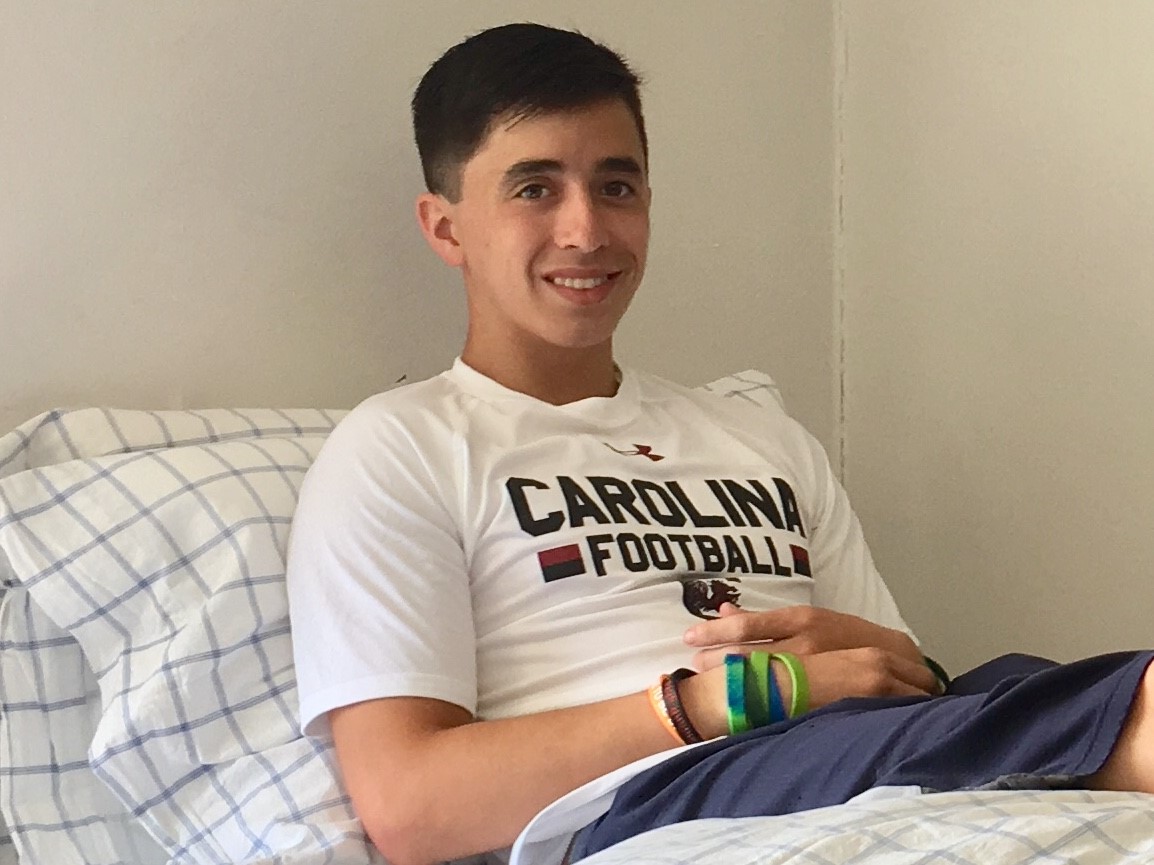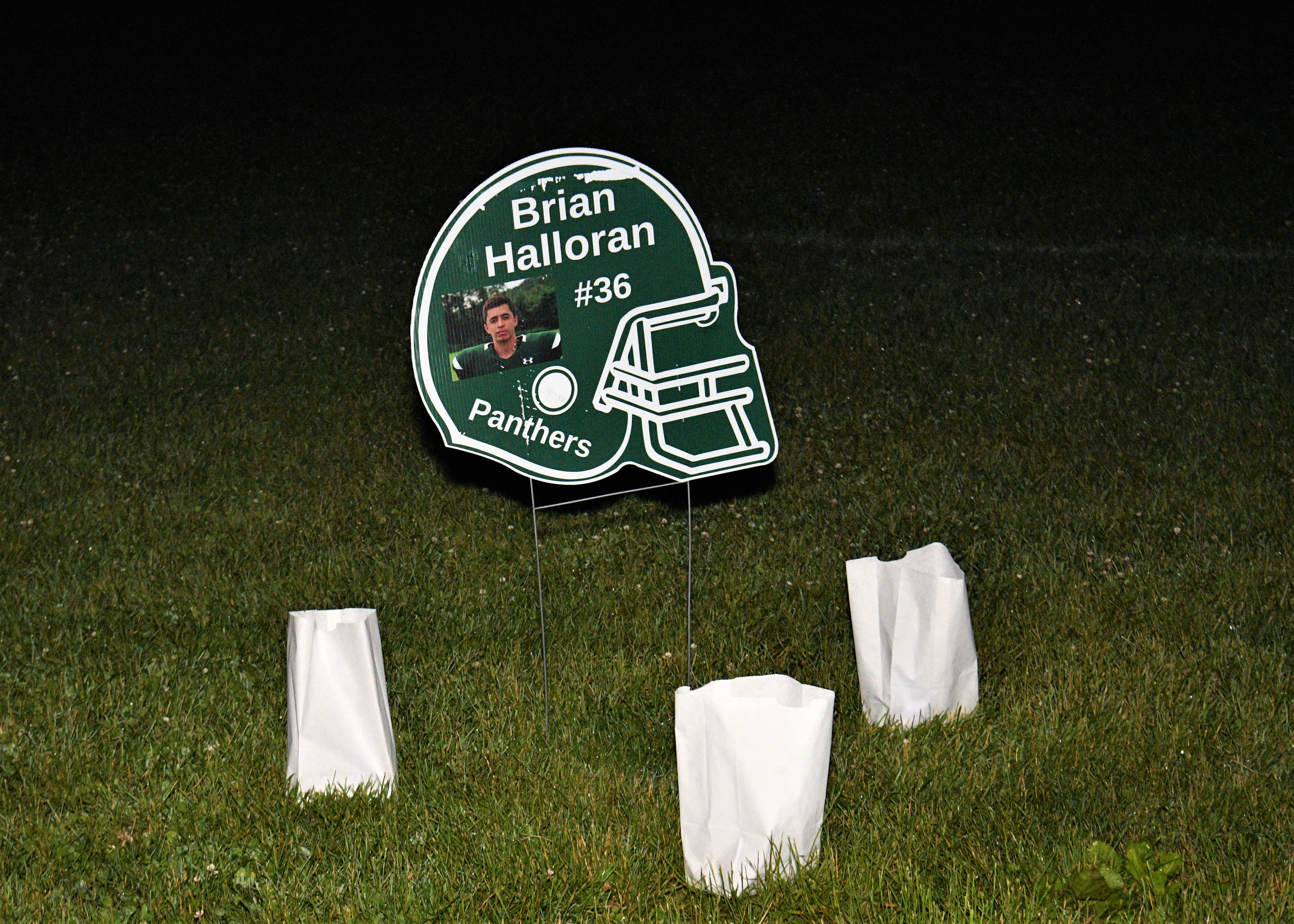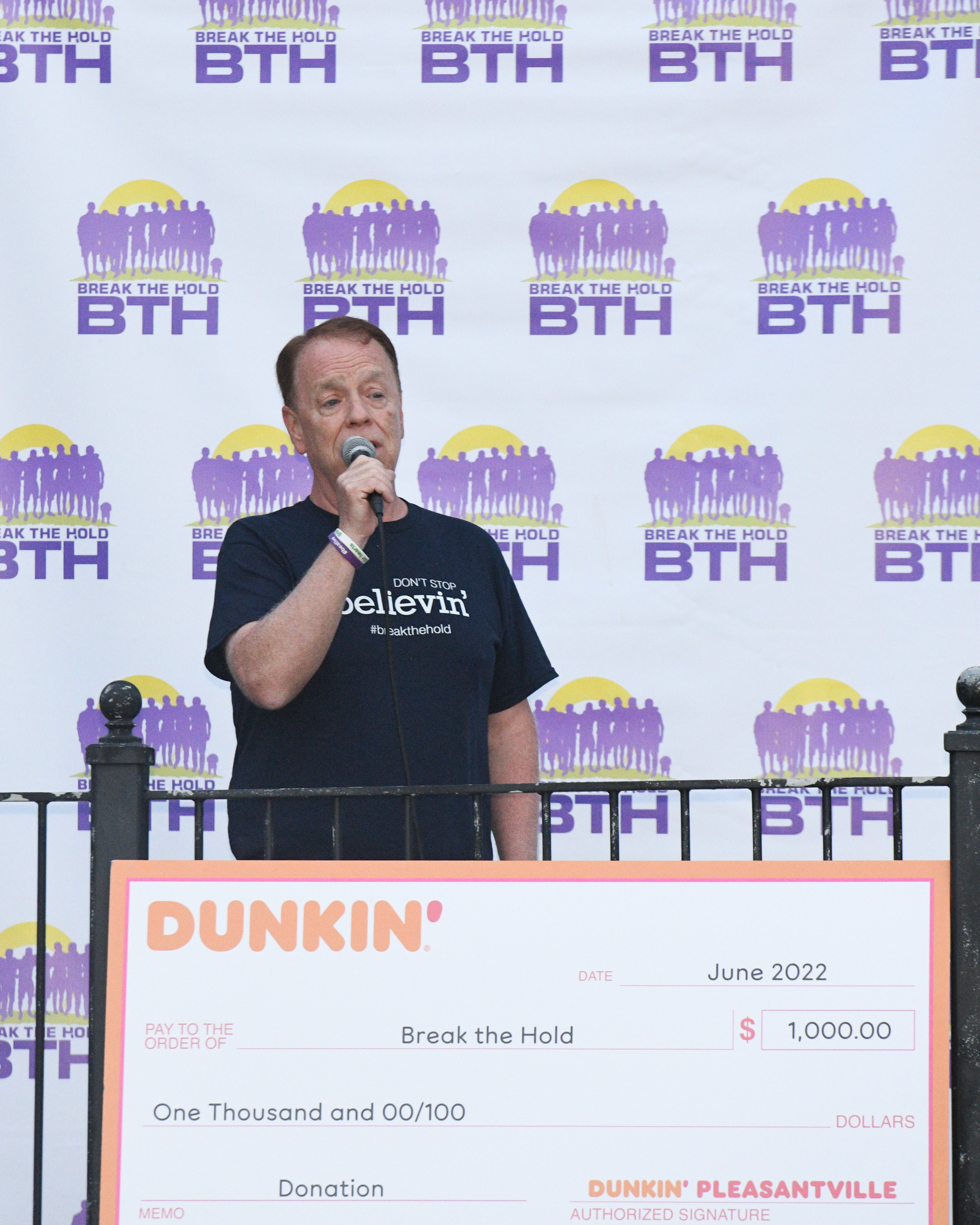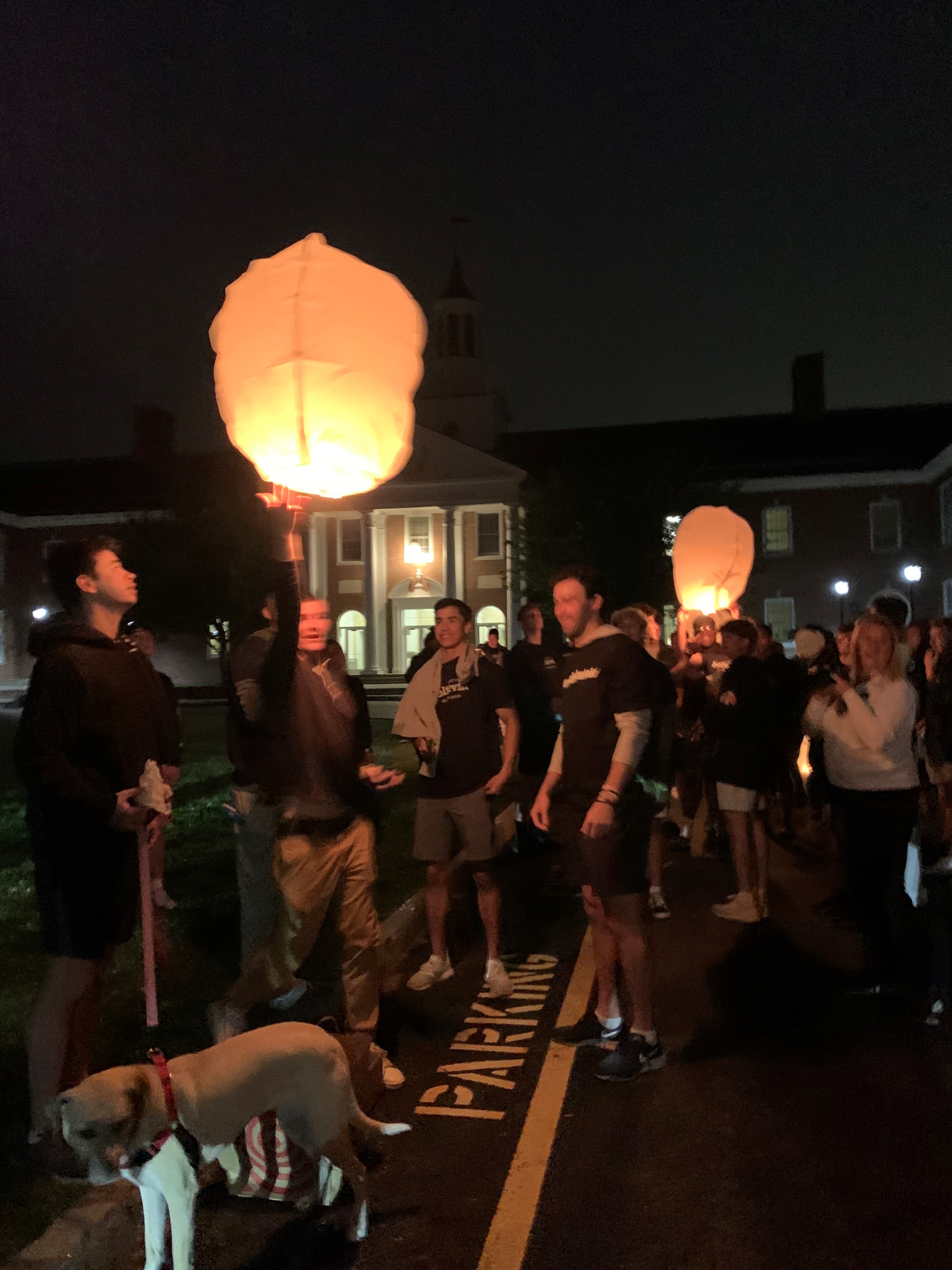Breaking the Hold of Mental Illness
News Based on facts, either observed and verified directly by the reporter, or reported and verified from knowledgeable sources.
A Pleasantville father turned the private pain from his son’s suicide into public purpose

Good morning! Today is Wednesday, June 29, and you are reading today’s section of Examiner+, a digital newsmagazine serving Westchester, Putnam, and the surrounding Hudson Valley.
Need to subscribe — or upgrade your Examiner+ subscription to enjoy full access to all of our premium digital content? Take advantage of our special FREE TRIAL OFFER.
Take Examiner+ on a test drive today at NO CHARGE for a full month. Enjoy full membership-level access to all of our premium local content, delivered straight to your inbox six times a week.
Today’s presenting sponsor of Examiner+ is Manhattanville College.


On January 23, 2018, Brian and Jolina Halloran lost their middle son, Brian Thomas Halloran, to suicide from depression. A graduate of Pleasantville High School, Brian was a freshman on a scholarship at the University of South Carolina at the time of his death.
The day after he passed, Brian’s father founded Break the Hold (BTH), a foundation committed to “Break the Hold” on mental illness — especially for children and young adults — by providing educational and suicide prevention programming.
Recently, Examiner+ connected with Brian Halloran to learn more about the foundation he launched to honor his late son, its mission, current programming, and support from the Pleasantville community.
Examiner+: The day after you lost your son, you decided to found Break the Hold. Can you walk me through what was going through your mind at the time and how you decided that you wanted to start the foundation in Brian’s honor?
Brian Halloran: I thought I was going to lose my mind. I had so much energy, pain, anger, frustration, and sadness, and I felt like I had to redirect it.
I came to the conclusion that I wanted to do something in my son’s honor. I wanted to have some kind of tag for him, but I didn’t want it to be the Brian Halloran Memorial Fund. His initials were BTH, so I created the name Break the Hold. It’s an overarching saying that is supposed to mean breaking the hold on mental illness, suicide, and the difficulties of finding resources to help people in need.
E+: Today, BTH has a wide array of educational initiatives, including Dialectical Behavior Therapy (DBT) programming at the high school and middle school levels. Can you tell me about this work?
Halloran: When we started BTH, we started doing awareness-type events. We did some college transition seminars for seniors in high school. My son passed away as a freshman in college. That’s a very critical time [with] a lot of risk factors while you’re away, not at home, and with new people.
We wanted to do something a little bigger, and we knew that Pleasantville High School had a club called Dialectical Behavioral Therapy Skills Training for Emotional Problem Solving for Adolescents (DBT Steps-A) for students who are high-risk or could use some resources and counseling. I think it was underutilized, and a lot of people that needed it did not go to it. It was a completely voluntary thing.
We found that DBT Steps-A was a curriculum developed by Dr. Alec Miller, who founded Cognitive and Behavior Consultants in White Plains. They made it into a 32-hour curriculum. We thought it would be great to bring it directly to the school. What pivoted us in this direction was, in July 2018, New York State mandated that mental health instruction needed to be taught in high school curriculums.
That gave us a launching pad for developing a social-emotional learning program that would check the boxes and allow schools to provide mental health instruction because the mandate didn’t provide any real guidance or the funding to do these things. We took it as an opportunity to develop some programming.
Currently, we are in every grade in Pleasantville Middle School and ninth grade at the high school. In Elmsford, we’re in sixth and eighth grade. Most of the time, it’s being pushed in the students’ regular health classes [when talking] about mental health and mental well-being, as well as their physical health and physical well-being. It seems like a natural fit and slides in quite well.

E+: Does BTH provide the instructor for the in-school instruction?
Halloran: BTH sponsors a certified instructor who is normally a licensed clinical social worker to go into the schools and teach these programs. Sometimes schools have people that will teach it themselves, but most of the time, we do put the instructor in.
E+: And you work with educators and parents too?
Halloran: We also came up with something called BTH 360’ to provide like-type seminars and workshops for both parents and teachers and staff. We’ve had successful parenting programs going on now for several years.
E+: Is the DBT training something you’d like to see expanded in other schools throughout Westchester County and the state?
Halloran: Yeah, and I think it can geographically happen just about anywhere. We’re getting inquiries from Rockland County. Recently, there was a young man in Edgemont who died by suicide. We’ve been contacted by Edgemont for trauma resources and getting guidance on how to interact with students close to the situation. But we’re also gearing up to probably bring some programming there in the fall, and we’ve also been talking to a couple of other school districts to do the same.
We have created this model and are helping people locally. We want to expand that help. People can open their own BTH chapters. I think that’s a great thing because we’re a small, boots-on-the-ground organization.
To have school districts and villages calling us from 20 miles away speaks loudly about what we’re doing. It’s a very simple model. The curriculum is already written. You just have to modify it, implement it, and choose how you’re going to push it into your school.
E+: On June 12, BTH held its fourth annual Into the Light Walk to raise awareness about suicide prevention and mental wellness and honor those lost too soon. Can you describe the environment and energy at the sunrise walk?
Halloran: It’s one of our main two fundraisers. We have a gala dance, and that’s a fun time. The walk is supposed to be more emotional, inspirational, and, in the end, hopefully uplifting.

The first year was a huge turnout, probably 700 to 800 people. Walking through Pleasantville, that’s a gigantic number. Since then, it’s been 400 to 500 people, and this year was about the same.
We walk from the darkness of Pleasantville High School through the backroads of Pleasantville down to Parkway Field. My son was on the football team, and they have a little memorial set up for him there. Then we continue to walk up Bedford Road toward the high school and the library, and the sun rises on our faces.
It symbolizes going from darkness, always heading to the light. People get dark in their own heads sometimes, and they need to find the light and stay with that light — to continue to be resilient, to hope, and to know that there will be more light.
We end at the school and play a little music. This year’s theme was Don’t Stop Believin’. It’s a song by Journey, and the theme is pretty self-explanatory.
Keep the faith. There is hope. There is help. Things can get better. Things will change. Your triggers now will probably not be your triggers as you get older.
Stay the course. Live your life. You have a purpose. We’re here to help. We want you to be here. More people care than you know.

E+: I imagine it feels powerful to have so many members of the community participate in the walk each year. Has the Pleasantville community been supportive of BTH’s work and your family?
Halloran: I don’t know where we would be without the support of the Pleasantville community emotionally. The Pleasantville community is awesome. It’s small enough that everyone knows each other to some extent. It’s large enough that we can get a lot of things done.
We’ve set a model for implementing programming in an educational format here in Pleasantville, and we’re ready to bring it to other towns. The community has been nothing but supportive. They’ve been outstanding with their participation and financial support. We’re a totally volunteer organization, and if you can get 500 people to come out at 4:00 a.m. in the morning, it tells you something about the commitment there.
E+: How has BTH’s work impacted young people, especially its work to help destigmatize mental health struggles?
Halloran: We had a senior in high school who won the BTH scholarship this year, Ryan Miller. It’s $2,500 to a graduating senior who shows a fortitude, willingness and is a proponent of mental health [awareness and advocacy]. He’s a great kid, and he spoke [at the walk].
One of the reasons he joined us to volunteer a couple of years back is because he lost his cousin to suicide. It really affected his family, and he wanted to do something to get involved in this area. It was a really effective speech by him and obviously related well to the young people there.
We had another young man, Chris Maloney, who is 25 [speak]. Back in December, he was hit by a drunk driver on the side of the road in Texas. He spoke about hope, resilience, and how much BTH has meant to him. His emotional well-being was put to a big test when he almost passed away.
E+: Have parents expressed their gratitude as well?
Halloran: Parents continuously come up to me telling me I saved their kids’ lives. I don’t think that’s really the case, but I think it’s close. I think a lot of people helped save their lives.
People who die by suicide don’t just think about it [once]. They’ve thought about it for a while. They don’t want to die, but they get to a very, very low point where their mindset keeps telling them they have to do it; it’s the only way out; there’s no other choice right now.
At those low, low times, we need someone there to help them. We have to save them in those times when they’re not doing well.
E+: Has the work you’re doing through BTH been a therapeutic process for you?
Halloran: I would say very much so, yes. It’s very therapeutic, and it gives me a sense of purpose. It provides a purpose for my son’s passing. But, in the end, it’s a double-edged sword because it keeps me buried in [the area] of youth mental illness and suicide all the time.
I’m fielding calls from people that are very sad and have very troubling situations going on. I worry about them, so it’s difficult and hard. But I encourage them to call me. I’m always here to take those calls.
E+: For those who did not have the opportunity to meet your son, Brian, can you tell me about his personality?
Halloran: You’ll find that people who suffer from these illnesses are very empathetic, loyal, caring people. They also have a little bit of a bigger picture of what life is all about, rather than just chasing the almighty dollar, getting into the best college, or getting the best SAT score.
Brian was not the typical person that you would think would be taking his life from depression. He had a lot of friends, socially did well, had a girlfriend, and did well in school. [He was] fun, really funny, a good athlete, and a very smart student.
But it doesn’t matter how well you do, how good you look, or how great of an athlete you are. All that matters is how you feel about yourself and what the messages in your head are telling you. That you’re great, that you’re worthy, or you’re not.
Brian was a fun-loving, athletic, empathetic guy, and we miss him a lot.
E+: Of Brian’s many positive characteristics, what are the ones that you keep most close to you?
Halloran: Being empathetic, sensitive, caring, and reaching out.
To learn more about Break the Hold or get involved directly, visit the website here.
If you or someone you know is feeling suicidal, immediately call the National Suicide Prevention Lifeline at 800-273-TALK (800-273-8255) or text the Crisis Text Line (text HELLO to 741741). Both services are free and available 24 hours a day, seven days a week. All calls or messages are confidential and staffed with certified members of the American Association of Suicidology.
Bailey Hosfelt is a full-time reporter at Examiner Media, with a special interest in LGBTQ+ issues and the environment. Originally from Connecticut and raised in West Virginia, the maternal side of their family has roots in Rye. Prior to Examiner, Bailey contributed to City Limits, where they wrote about healthcare and climate change. Bailey graduated from Fordham University with a bachelor’s in journalism and currently resides in Brooklyn with their girlfriend and two cats, Lieutenant Governor and Hilma. When they’re not reporting, Bailey can be found picking up free books off the street, shooting film photography, and scouring neighborhood thrift stores for the next best find. You can follow Bailey on Twitter at @baileyhosfelt.
Examiner Media is a proud participant in The Trust Project.
CLICK HERE to review our best practices and editorial policies.
This piece is a news article. CLICK HERE to learn about our definitions for types of stories.
We welcome corrections, story ideas, and general feedback. CLICK HERE to use our actionable feedback form.

Examiner Media – Keeping you informed with professionally-reported local news, features, and sports coverage.

